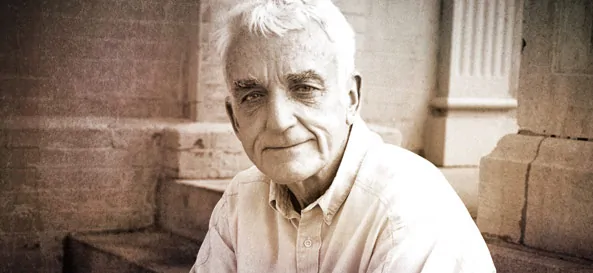
Editor’s Note: No words could do true justice to the marvel that was Brennan Manning. His life was a remarkable testament to grace, and he expended every ounce of his considerable energy teaching the rest of us to live in his attitude of awe-drenched humility and delighted gratitude. This excerpt, from his exceptional 2011 memoir All Is Grace, serves as a tribute to a man who taught millions to embrace their identity as God’s beloved and whose hard-fought battle came to an end late Friday night. We at RELEVANT are saddened by his passing, but rejoice that he is now with the Abba he served so joyously for 78 years.
The last few years leading up to our divorce tore my emotions to shreds. I was traveling way too much, isolated and drunk. On the surface it appeared I was doing well. But below the surface loneliness and insecurity churned with a merciless fury.
I did make one decision I’ll never regret though: hanging out with some good men.
I sent an invitation out to a group of men who knew me but didn’t know one another, The invite was simple: Join me for a few days in Mississippi.
There was a common denominator among these men, one of the reasons I invited them and not others. It was something I shared too—we were all broken.
Our first meeting was nothing short of beautiful. My original plan was for our gathering to be a one-time event. But at the conclusion of that first meeting, everyone repeated a variation on a word that meant a great deal to me: “Let’s do this one more time.” More. Our time together that second year concluded with the same desire. So we planned a repeat.
As groups often do, we thought some kind of name or label would be good, something to call ourselves. We wrestled awhile but couldn’t agree on anything. Then one year found us at a Catholic retreat center in Colorado Springs. The nun at the front desk asked the name of our group, and I blurted out, “The Notorious Sinners.” She grinned and replied, “And what makes you so notorious?” Her question was rhetorical, but I laughed, and our moniker stuck. The name fit like a hand in a glove.
In the best sense of the word, our time together was a sanctuary. But it was also hard. There were hard years, times when my alcoholism and an alcoholic’s behaviors became the sun around which everything else revolved and sometimes got scorched. I am not proud of those times, but they occurred nonetheless.
Several of my good friends, men of my own kind, confronted me over the years about my lying. It wasn’t so much the lies about the big things as the lies about the little stuff, the need to lie at all. Why does an alcoholic lie about the petty? To stay in practice. Alcoholism isn’t called “the Liar’s Disease” for nothing.
Those confrontations never went well. I only wish I could have trusted then what I believe now. There’s not a chance those confrontations ever came from a place of malice; they were always rooted in love. However, I always heard their words as criticism, and as such, I reacted in defensive anger. For me, the anger was simply a mask, a mask for fear. I dimly suspected that then, but I can confess it now.
Of all the Notorious Sinners, I have known Paul Sheldon the longest. As I’ve looked back through my journal entries and notes about the people in my life, I have constantly referred to him as “my best friend.” However, I do not believe that the word best honors my relationship with Paul. I rather prefer the word oldest.
As others have done over the years, Paul sought out a friendship, something beyond nine
days. It wasn’t an immediate connection; in fact, it took almost two years for us to become close. But once we did, we were. The booze helped.
I know there is a cadre of young Christian leaders these days who find talking theology over beer to be something exhilarating and edgy, as if combining the two hadn’t occurred to anyone before. I believe those young men have historical amnesia. Paul Sheldon and I were doing that when those guys weren’t even a thought. Paul and I would get drunk and talk about God for hours and hours. Those times were like Christmas.
Paul was a stockbroker at the time, married to a wonderful woman named Jennie, a consummate Southern cook who learned quickly that I loved to eat. Paul and Jennie welcomed me into their
lives like I was family, and I cherished their invitation. After I met Roslyn and she became a part of my life, the four of us would go out together—Paul and Jennie and Roslyn and me. Not everyone was comfortable with the idea of double dating with the priest, so the deliberate approval of Roslyn and me on Paul and Jennie’s part was something beyond words. They chose us, unconditionally; it was huge.
The booze always flowed freely between Paul and me. But in November of 1980, Paul stopped drinking. I didn’t. Our friendship did not cease on that day, nothing like that, but it did change. In terms of the dynamics of any relationship, if one person changes, the relationship changes; it is not the same as it was. No way it can be. Paul’s unchaining himself from the bottle gave him some clarity and perspective that I did not have. I thought I did, but I didn’t. In other words, Paul got honest and I did not.
I mentioned earlier that a handful of Notorious Sinners confronted me on various occasions for lying. One of those stalwart souls was Paul. In early 2000, he had noticed I’d made some statements that simply were not true. I tried to brush them off as exaggerations, but Paul called them lies.
He had also noticed an anger in my preaching that concerned him; his literal words were “It scared me.” My oldest friend shared his concerns with me. Some might immediately pull out the phrase “tough love,” but remembering that time now, his were nothing short of tender, heartfelt words. But an alcoholic’s best defense is to get defensive, and so I did. Our relationship did not dissolve, but it did splinter somewhat; and it felt fragile for a while after that.
Paul’s confrontation was uncomfortable and unpleasant at the time. But if I’ve learned anything about the world of grace, it’s that failure is always a chance for a do-over.
Less than two years later, I made a visit to Paul at his home in Point Clear, Alabama. I was still intent on playing defense, but Paul surprised me with an offensive play that won the match. He told me he wouldn’t retract any of his concerns, but despite them, he did not want to lose our friendship. Now, probably those words by themselves would have been enough, but Paul’s words were bathed in tears, a man’s tears.
Most people don’t know what to do with a man’s tears. I’m still not sure I do. Despite all our efforts at honesty, men are still expected to be strong, competitive, and in control. Tears are, unfortunately, not on the most-wanted list. But there are rare misty-eyed men who in the largesse of God’s grace happen to befriend us and reveal to us a different way of living, one fiercely tender and loyal. Such a man is Paul Sheldon, and on that day his tears stanched a wound that I could have let fester for years.
I wish I could also report that his tears stopped the flow of my drinking and exaggeration and anger, but that wouldn’t be true. What they did do was heal a friendship that would still suffer
but would be stronger than before.
Paul’s confrontation was uncomfortable and unpleasant at the time. But if I’ve learned anything about the world of grace, it’s that failure is always a chance for a do-over. Paul, my oldest friend, gave me just that.
Copyright 2011 Brennan Manning. All Is Grace published by David C Cook. Publisher permission required to reproduce in any way, including but not limited to, downloading, e-mail, or websites. All rights reserved.





















